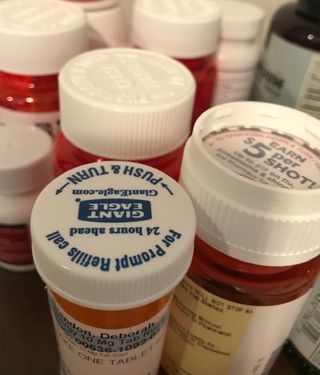
Depression
Why are Patients Reluctant to Take Medication?
A personal account of fear of side-effects of anti-seizure/anti-depreassant meds
Posted November 23, 2018
I’ve been through this before, the emotional fragility and unwarranted tears. Depre—No. No. I couldn't bear the thought of returning to that black bottomless pit. I can't even bring myself to use the word.
I search my memory. Why now? Has something triggered it? A fleeting thought: Is it related to yesterday's bout of sensory overload?
I have cavernous angiomas, clusters of thin-walled blood vessels in my brain. Two of them had bled, turning my life upside-down. To prevent future bleeds, I underwent three brain surgeries to remove the culprits. The ordeal left me with a number of neurological challenges.

Among the various meds I take to manage these issues is the anti-seizure medication, Lamictal, which was prescribed by my neurologist several months before my surgeries. The 300 milligram daily dose was effective, but I looked forward to my post-surgery days. I was sure the surgeries would eliminate many of my symptoms, especially the seizures. I believed that eventually, I’d be able to wean myself off the Lamictal.
I was wrong—the seizures made a comeback, and my daily dose was increased to 400 milligrams.
It did not occur to me that the dose would go any higher. I certainly didn’t think that Lamictal would target another aftereffect of the surgeries—depression. In fact, the thought that I was suffering from biological depression didn’t enter my mind until I tumbled into the maw of suicide ideation.
During the first four months after the surgeries, I attributed my frequent tears to situational depression: I'd been through a lot; depression was to be expected. But after I became suicidal, fear of returning to that state of mind chased away denial, and I admitted my thoughts of suicide to my therapist, who pointed out that brain injury itself can cause depression. Since Lamictal is also a mood stabilizer, my psychiatrist increased my dose to 600 milligrams, which successfully controlled both depression and seizures.
Prior to the brain bleeds, I’d always kept my use of any type of medication to a minimum: painkillers for headaches and antibiotics for bacterial infections, nothing else. Now here I was, popping pills daily—6 pills to manage seizures and depression; two pills for blood pressure, to prevent additional bleeds; two pills for a folic-acid deficiency often associated with depression. In addition, I took a variety of pain-killers for crippling headaches. I felt like I was poisoning myself with all these meds, and the Lamictal was the worst of the lot, especially now that I was on a higher dose.
But I was confident that my depression was temporary. I was convinced that it was caused by the surgeries and that as I healed, my depression would subside. In time, I would be able to eliminate the Lamictal from my daily regimen of medication altogether.
Five years after the surgeries, my seizures and depression seemed to be things of the past, and, with my neurologist's and psychiatrist's blessings, I started decreasing the Lamictal dose. After several trial runs with lowered dosages, I was down to 500 milligrams per day.
Unfortunately, a couple of years later, the meds lost effectiveness—once again depression shadowed my every step. My psychiatrist, instead of increasing the dose of Lamictal, augmented it with another anti-depressant, Celexa. Not only did my depression abate, but so did my spells of sensory overload.
Sensory overload: During my first few years of recovery, I had enormous difficulties processing incoming sensory data. When the circuits in my brain overloaded, they jammed up, causing confusion and panic, which usually brought on spectacular meltdowns followed by emotional fragility that sometimes lasted for days.
According to my psychiatrist, the Celexa, in addition to addressing depression, also reduced anxiety, which had been feeding into sensory overloads, making them worse.
But now, years post-surgery, sensory overload was a rare occurrence; at its worst, I merely teared up, and then only briefly.
But over the last few weeks, I'd occasionally become weepy for no apparent reason. At first, I assumed that theses episodes were related to sensory overload. But given their increasing frequency, I started to wonder.
Then this morning, more than a decade since the surgeries, with no warning, I found myself sobbing, tears streaming down my cheeks.
What was going on? I recalled that yesterday, after attending a crowded event at work, I suffered an extreme case of sensory overload, such as I hadn’t experienced in years. I hadn’t had a meltdown since…since when? Two, three years ago? Probably more. Was today’s crying jag just an aftereffect of yesterday’s overload?
I shied away from the thought that this morning’s tears were due to depression once again descending. But I couldn’t repress my inner voice whispering about the possibility. I can't afford to stick my head in the sand. I cannot risk spiraling into the abyss like I did so long ago.
I probably should make an appointment with my psychiatrist as soon as possible—but she might increase the dosage of Lamictal or Celexa, and I feel the old resistance to "more meds" rise up. Will it do any harm to wait a bit longer? Maybe this is just be a blip that will pass.
I’m calmer now, no longer crying. Yes, I decide, I can afford to wait and see. I’ll hold off, for now. Until tomorrow, if I find myself weeping uncontrollably again, for absolutely no reason.



